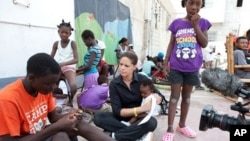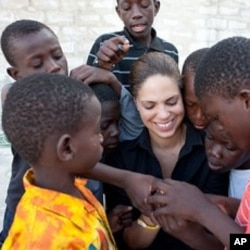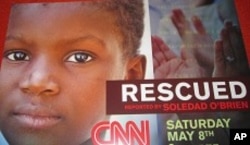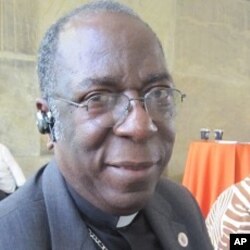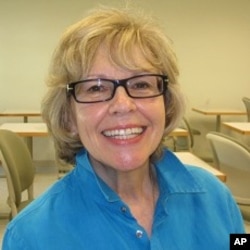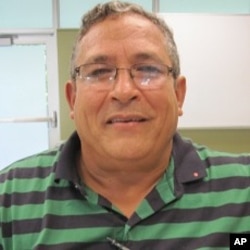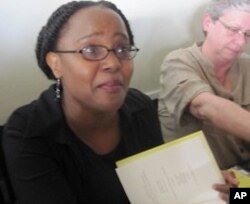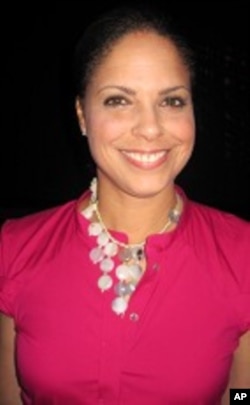Over a hundred invited guests filled the University of Miami's Bill Cosford Theater May 4 to see a preview of CNN's documentary "Rescued". The program, hosted by CNN special correspondent and anchor Soledad O'Brien focuses on the lives of two Haitian orphans: Cendy Jeune and Mackenson Olibrice. The children were taken in by American missionaries Susette and Bill Manassero and placed in their orphanage "Maison de Lumiere" - Lighthouse - in Port-au-Prince.
The Manasseros are from Redondo Beach, in southern California and decided to move to Haiti after traveling to the country to meet a child they had been helping financially. Their daughter, Arianna who was eight at the time convinced them to pack up everything and move to Haiti so they could help more children.
There are 380,000 child orphans in Haiti. Unlike most orphanages, Susette and Bill Manassero's main goal is not to find people willing to adopt the children. Instead, they aim to "rescue" the orphans, providing them with food, shelter, love and an education. Their hope is that the children will give back to their homeland when they grow up.
Reporting the story
O'Brien says she learned of the Lighthouse orphanage through a young man she met while reporting in Haiti a week after the January 12 earthquake. CNN was the first news organization to report from inside the country following the devastation. She says she wanted to "help put a face on the hundreds of thousands of orphans living there." She adds that they tell the larger story of the country and its challenges prior to and following the catastrophic tremor.
"There's a young man named Jonathan Olinger who I ended up meeting in Haiti and he'd been shooting at this orphanage since 2007 and he is a fantastic photographer and his storytelling is amazing! And so we met up right after the earthquake and we thought 'well, we could work toghether' this could be a wonderful documentary on CNN. "
O'Brien says the network brought in their own videographers and producers and combined with the images Olinger had managed to capture during previous years, they were able to document the children's lives before, during and after the devastating earthquake.
Cendy's story
O'Brien says although six-year-old orphan Cendy Jeune's story is typical in Haitian terms, (her parents abandoned her years ago because they couldn't afford to raise her) the issue is a complicated one.
"It's so different than how we understand things in the United States. Child slavery but legal. Orphans but with parents. You know, and it's this story of contradictions that I think are sometimes hard for people here in the United States to fully grasp," she says. "I think the restavèk issue, there is an opportunity to figure out what is going to happen to that issue. I think that you can not have children living in desparate poverty, living as child slaves and have a healthy country."
Marc Kenson's story
Marc Kenson Oliphi, the young man featured in "Rescued" is a former "restavèk" - a child slave. His parents sold him and his sister for $120 Haitian dollars, the equivalent of $10 - $12 US dollars. He spent years living in poverty with a woman who made him call her "auntie". Marc Kenson remembers begging for money in the streets of Port-au-Prince and the beatings he received. The Manasseros "rescued" him, and provided him a home at the Lighthouse. Now 18, he is the caretaker of their guest house. Marc Kenson says he would like to be a mechanic some day. He adds that he'd like to earn enough money to open up his own orphanage where he could help children.
The majority of Haitians are familiar with "restavèks" - child slaves. But some find it incredible that the world's first black republic, a nation who won its independence from France after a fierce battle in 1804, would condone the very same practice it was willing to shed blood to repeal 206 years ago.
Dr. Fritz Bazin, Archdeacon for Immigration and Social Injustice for the Archdiocese of Southeast Florida says he hopes "Rescued" will encourage Haitians to correct this injustice.
"I think the documentary represents an aspect of the Haitian reality," he said. "When one talks about a 'restavèk' for example, at my own home, growing up I remember having children who were living with us -- to be honest they were child slaves -- we didn't recognize it was wrong. And the church, all churches in Haiti in fact I remember when I was in Haiti there was always a mass in the afternoon for the poor and 'restavèks'. That means [the church] participated and in fact perpetuated the injustice. But now, people are more aware of the issue, especially after the earthquake that has forced all the classes of society to mix [and live together]. I think that has to force some social changes as well."
Keeping the spotlight on Haiti
The University of Miami's School of Communications co-hosted the exclusive screening along with the Florida Immigrant Advocacy Center. FIAC Executive Director, Cheryl Little says she was thrilled at the opportunity to take part in the event.Soledad O'Brien, whom she had met previously during the filming of CNN's documentary "Latino in America" was the keynote speaker at FIAC's annual dinner last February.
"She [Soledad] asked us if we could host the screening and we obviously jumped at the opportunity. I think it's extremely important for people to see this documentary with respect to kids who have been orphaned in Haiti."
Little feels it is important to keep the focus on Haiti and its people post-earthquake.
"You know, Haiti was very much in the news there for a while after the earthquake but it seems we all have very short attention spans. I think one of the resounding messages of this documentary is we've got to be in it for the long haul. I mean we've really got to stick by Haiti this time," she says " and try to make sure that the country and its people can get back on their feet."
Panel discussion
The screening of "Rescued" was followed by a panel discussion moderated by Soledad O'Brien. The panel featured University of Miami's Dr. Barth Green, founder of Project Medishare for Haiti, acclaimed author Edwidge Danticat, FIAC Executive Director Cheryl Little, and Robert Duval founder of L'Athletique d'Haiti, an after-school sports program that helps Haitian children in Port-au-Prince.
Duval arrived in Miami May 4 -- his first trip out of Haiti since the earthquake. He talked about the current situation inside the country where thousands have been displaced. His sports club is now home to 2000 earthquake survivors.
"The situation is globally catastrophic," Duval said, "because there are many places that the displaced now occupy and although there's a move now to resettle them in other camps, like 'Coraille' for example, it's just a tiny drop in the bucket. I personally think it's a problem at the society level that Haitians will have to resolve. These people are saying the society will have to deal with them - that now people will have to look them in the eye and say something. There must be a specific resettlement plan."
Duval says American celebrities Patricia Arquette and Sean Penn have been very helpful in getting him some assistance for the displaced living on his land but much more is needed.
Layers of victims
For Haitian--born author Edwide Danticat who returned from Haiti three days ago, "Rescued" shows the problems Haitians have been facing since the earthquake. She says there are many levels of victims.
"I think the documentary -- because Haiti is no longer in the news -- provides an interesting aspect of the crisis in Haiti. There are children who are orphans, there are children who foreigners have adopted and there are children that we Haitians have taken into our homes. So I think it's interesting to show that this earthquake left behind several layers of victims. In every society children are the most fragile, some are in precarious situations -- so this helps us to remember the plight of those children. It's an ongoing fight," Danticat said.
Many questions, few answers
During the post-screening question and answer session audience members wanted to know where is the aid money going? Why isn't the assistance reaching survivors? How hard is it to adopt a child? What they can do to help?
There was no definitive response from the panelists, although Dr. Barth Green of Project Medishare for Haiti suggested people collect money to hire a contractor and build an earthquake-proof building. No buildings have been built since the earthquake, he told the audience. But many members said they felt frustrated about the lack of progress and the dire living conditions of the Haitian people.
"These kids and adults as well but they've lived in these horrible conditions, deplorable conditions prior to this and conditions that we never thought it could get worse. And now it's worse," an audience member said. " And you've got kids that aren't gonna live. So what's the future of Haiti? I don't think taking the kids and adopting them out of the country is the answer, but just leaving them there is not the answer either."
Back to Haiti soon
O'Brien says she hopes to do more reports on Haiti in the future.
"I think the natural progression is accountability but I think it's accountability with context. Well what SHOULD Haiti look like? What SHOULD the government look like? You know there are 14,000 NGOs by some people's estimation in Haiti. What will their role be? Can you have a weakened government and all of these NGOs, I mean is that possible? And where in the hierarchy will the issue of children, maybe specifically restavèks, where will that fall when they have an opportunity to rebuild and reconfigure the country," she says.
O'Brien spent a week in Haiti post-earthquake and an additional week reporting for the documentary. She says she will return to Haiti next month for five or six days but this time it won't be for work. She plans to take her daughter with her to volunteer at an orphanage.
CNN's documentary "Rescued" will air Saturday, May 8 at 8:00 p.m. (EST) .




